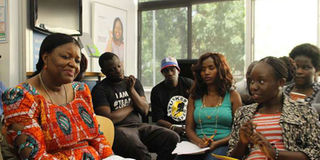AMKA is still a fertile forum for nurturing women writers

Nigerian ambassador to Cote D'Ivoire Ifeoma Akabogu Chinwuba during a talk when she visited Nairobi over the Easter holiday for two literary events. The AMKA audience today is richer than it was ever before. Yes, it was primarily meant for women, but there are more men in the audience now. PHOTO | COURTESY
What you need to know:
- Has AMKA changed over the years? Certainly it has. It now attracts men and women in equal measure. Amateur writers, established writers, professors, journalists, publishers, stay-at-home mums, teachers… the AMKA audience today is richer than it was ever before. Yes, it was primarily meant for women, but there are more men in the audience now.
- And speaking of women, I would strongly suggest that AMKA should consider having a female moderator on board in order to bring in the uniquely female perspective on certain issues as the writer points out.
As a successful product of the AMKA Literature Forum that is held every last Saturday of the month at the Goethe Institut, Nairobi, I feel compelled to respond to Oumah Otienoh’s article titled "Female writers not keen to attend literary debates", where he decried the under-representation of women in the audience and alleged that the few in attendance had their views gagged by the moderators Dr Tom Odhiambo and author Tony Mochama.
The writer rightly points out that AMKA started out as a space where women honed their writing skills.
To use one of the terms in contention in the article, I was a literary virgin when I first attended the AMKA sessions in 2008. I was straight out of university and my writing had hitherto only existed in my journals and in my mind. I attended a few sessions, where I sat quietly at the back, but the rich discussions and positive critique of the works under the microscope gave me the final push to present my short stories and poetry.
It was in AMKA that I discovered my strength in short story writing, and where my craft blossomed into a published work, Fresh Paint, a short story and poetry anthology published in 2011 featuring the works of women writers.
MALE AUDIENCE
Has AMKA changed over the years? Certainly it has. It now attracts men and women in equal measure. Amateur writers, established writers, professors, journalists, publishers, stay-at-home mums, teachers… the AMKA audience today is richer than it has ever been. Yes, it was primarily meant for women, but there are more men in the audience now.
That said, the audience could certainly stand to gain from participation from more women, as the writer points out. Why, for example, would AMKA be reading texts by male authors? The answer is simple: Not enough women submit their works for critique.
Should the forum, therefore, stop because of lack of texts by women, even though call outs have been made through e-mail, Facebook and this magazine for articles to be submitted and for women to attend the sessions?
And speaking of women, I would strongly suggest that AMKA should consider having a female moderator on board in order to bring in the uniquely female perspective on certain issues as the writer points out. Some of the names that immediately come to mind are Prof Elizabeth Orchadson Mazrui, Muthoni Garland, Sitawa Namwalie, Muthoni Likimani… the list is endless!
Now about those gagging allegations. As a regular attendee of AMKA forums, these allegations come as a shock, especially as I know the two regular moderators to be open-minded, experienced and fair. To me, it seems that Oumah is propagating the ‘women as a victim’ mentality that our African literature is oh-so fond of doing. Unless duct tape and ropes were involved in the gagging, then I feel it was the responsibility of the women in the session to put their feet down and make their views heard, even if it meant standing on chairs and going on hunger strike against the tea that is offered in every session.
Lastly, I join Oumah again in challenging myself to attend and participate in all sessions and also appeal to women writers out there to do the same.





